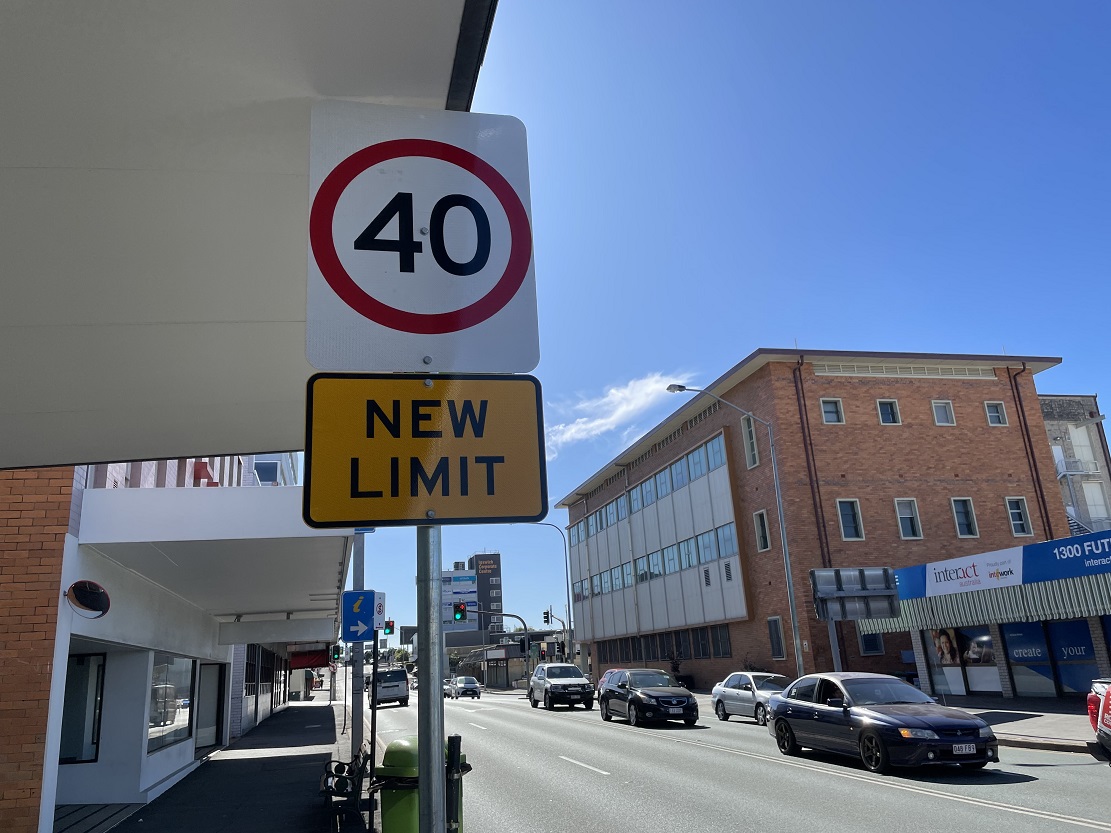New city centre speed limits of 40km/h have brought Ipswich into the global era of friendlier, safer cities for all.
Ipswich City Council reduced the speed limits on key streets through the city centre from 50km/h to 40km/h in early May, in partnership with the Department of Transport and Main Roads (TMR) Vulnerable Road User Program.
Sections of state-owned roads including Brisbane Road and East Street were also reduced from 60km/h to 50km/h.
Decades of scientific research demonstrates that slower speed limits on urban streets don’t just lower road trauma but bring broader economic and social benefits.
Griffith University’s Cities Research Institute Deputy Director Professor Matthew Burke said reducing speed limits from 50km/h was now the norm across the world.
“Australia and New Zealand are way, way behind the rest of the world on speed limit reduction,” Professor Burke said.
“We are now in the dubious company of Qatar, Saudi Arabia and Chile in being some of the last hold-outs clinging to 50km/h limits.
“Most of Europe, Japan, Korea, the UK’s large cities, Canada’s, and even Washington D.C. and cities like Denver, all are enjoying 20km/h or 30km/h limits across their smaller neighbourhood and commercial streets.
“Indeed, Washington D.C. is trialling school safety zones at just 16km/h (10mph).
“The benefits have been observed over and over again: cycling, walking and scooter rates go up; car use goes down. Sidewalk businesses boom. Children walk and cycle to school in greater numbers. Queues of parents in cars waiting ages to pick up their kids can halve in length. Road trauma declines significantly and at lower speeds it disappears.”
A 2016 trial of reducing speed limits to 30km/h in Toronto was associated with a 28 per cent decrease in the collisions between pedestrians and vehicles.
And in 2020, research from Monash University found that “lowered average travel speeds brought about by a reduction in speed limits in urban and metropolitan areas will bring about considerable reductions in road trauma”.
The Monash research further found vulnerable road users were likely to benefit most from average travel speed reductions, and lowering speed limits “can prove to be a highly effective way of achieving and sustaining the long-term goals and intermediate targets proposed in traffic safety strategies and action plans”.
Within south-east Queensland, speed limits in highly pedestrianised areas such as Brisbane City and South Bank were reduced to 40km/h several years ago, with immediate benefits for pedestrians and cyclists.
Peak pedestrian body Queensland Walks Executive Officer Anna Campbell congratulated Ipswich City Council and TMR for taking road safety seriously.
“Safe and active streets are people-friendly streets, and Ipswich must be commended for putting residents’ needs first in road safety and in place-making,” Ms Campbell said.
“We know that residents and visitors alike love being active in slower and safer streets, and as a result, people spend more time in safer streets and businesses will see more shoppers to the area.
“Safe streets attract local residents who will support local business and safe streets create family-friendly places to visit. As a result of safe streets we see thriving businesses and better tourism.
“If you design for faster roads, you get more cars driving though. If you design for people, you get more people stopping and staying, and that is good for business.
“That’s why Ipswich is onto a winning decision by supporting safer streets.”
The decision to reduce Ipswich’s speed limits followed a review from the Speed Limit Committee which includes representatives from Queensland Police Service, Ipswich City Council, and the Department of Transport and Main Roads.
“People don’t like spending time – or money – in city centres with higher-speed road traffic,” Professor Burke said.
“They cross the road less, inhabit the footpaths less, walk less, linger less. People don’t want to sit at a roadside cafe on streets with higher speeds. They stay in their cars more, even driving from parking spot to parking spot.
“Almost all of Australia’s main town centres, including in Brisbane, Broadbeach, Maroochydore, and even small towns like Winton, have reduced their speeds down to 40km/h or less, and seen business activity increase after the changes.”
Council’s efforts to reduce road trauma and create safer streets for all are outlined in plans and strategies such as the iGO City of Ipswich Transport Plan, Active Transport Action Plan and Road Safety Action Plan.
Read also:
>> BRIGHTDAZE ahead for this year’s SPARK Ipswich festival
>> 2023 Ipswich Art Awards winners announced during a weekend of celebrations


